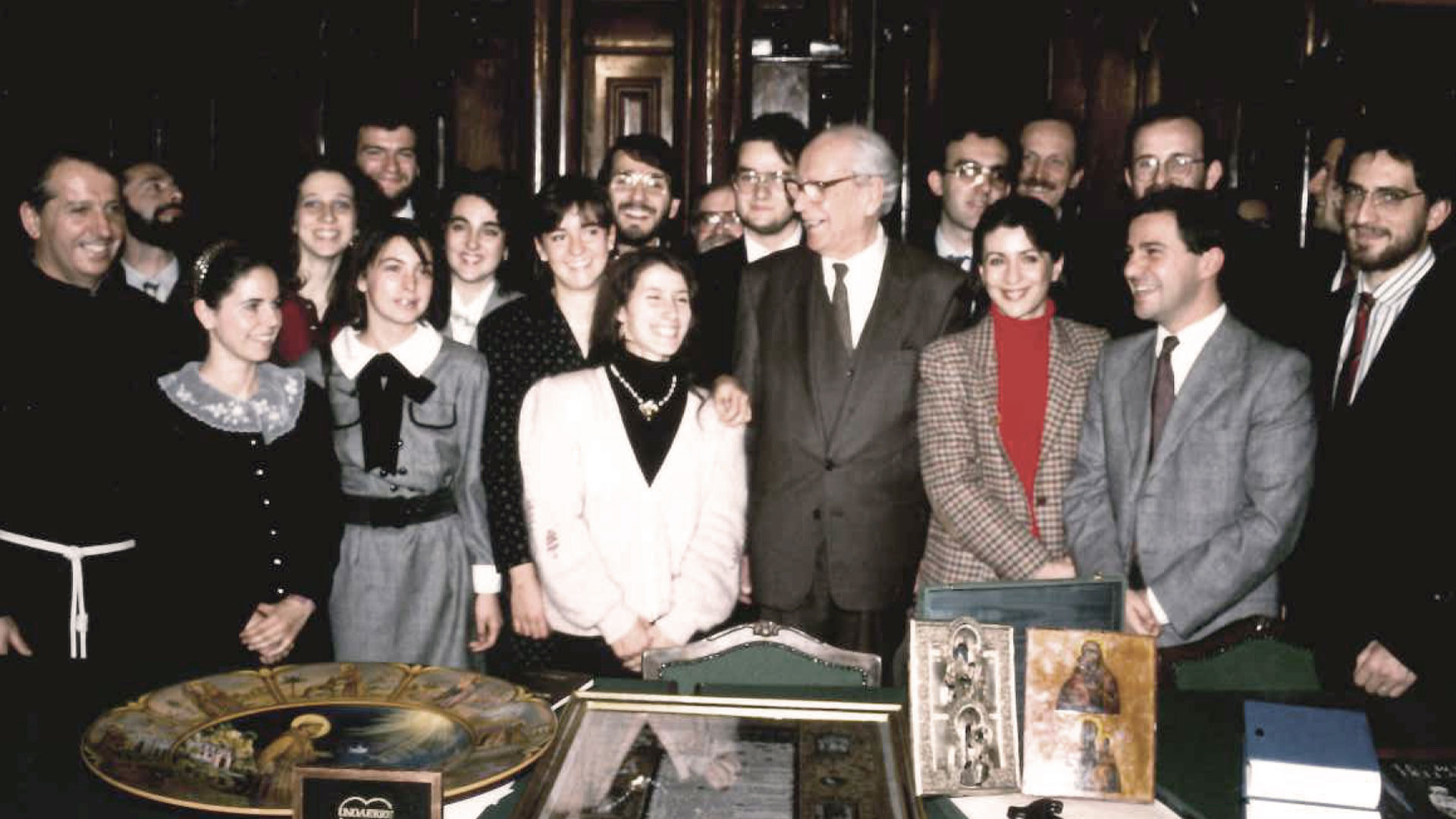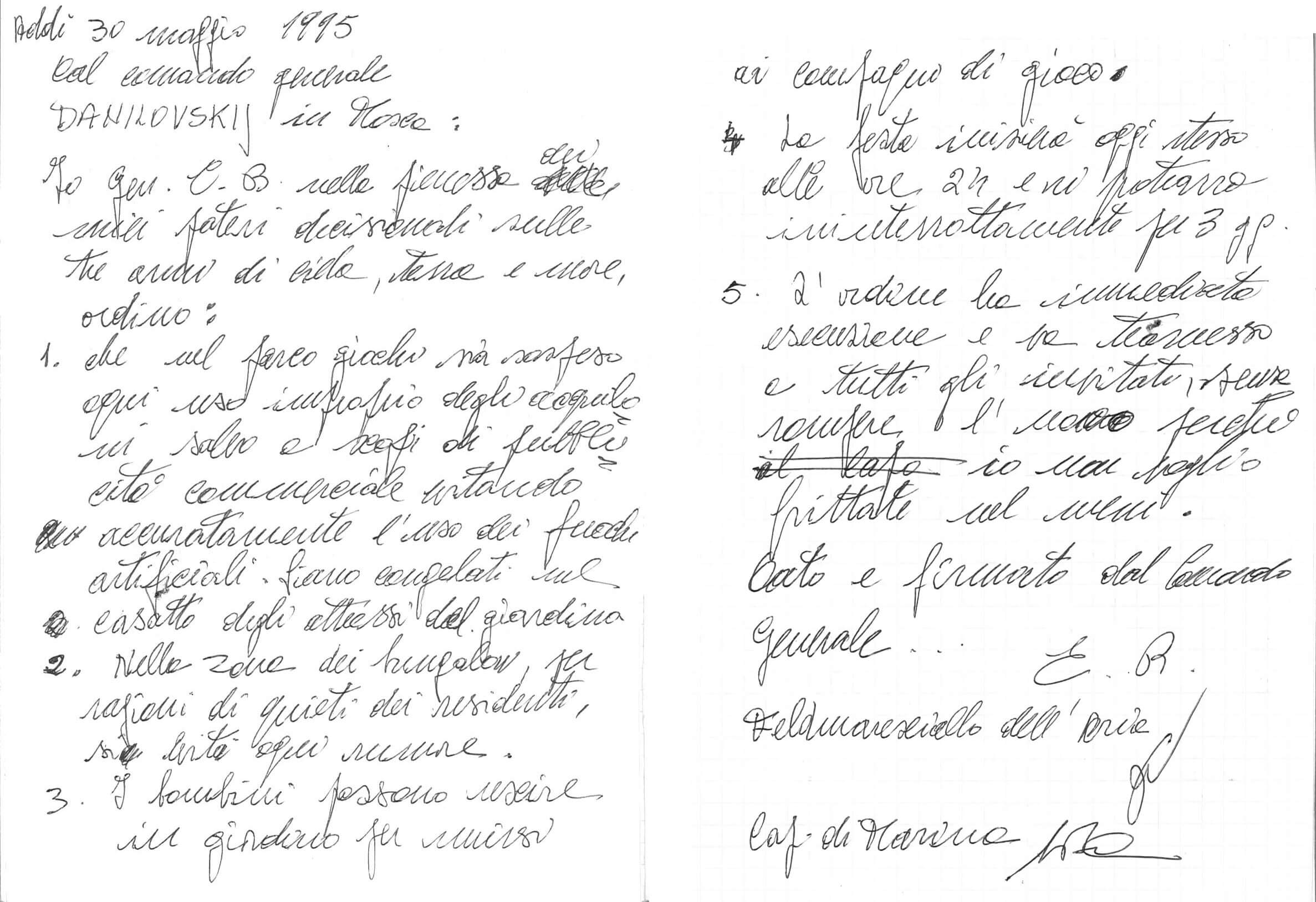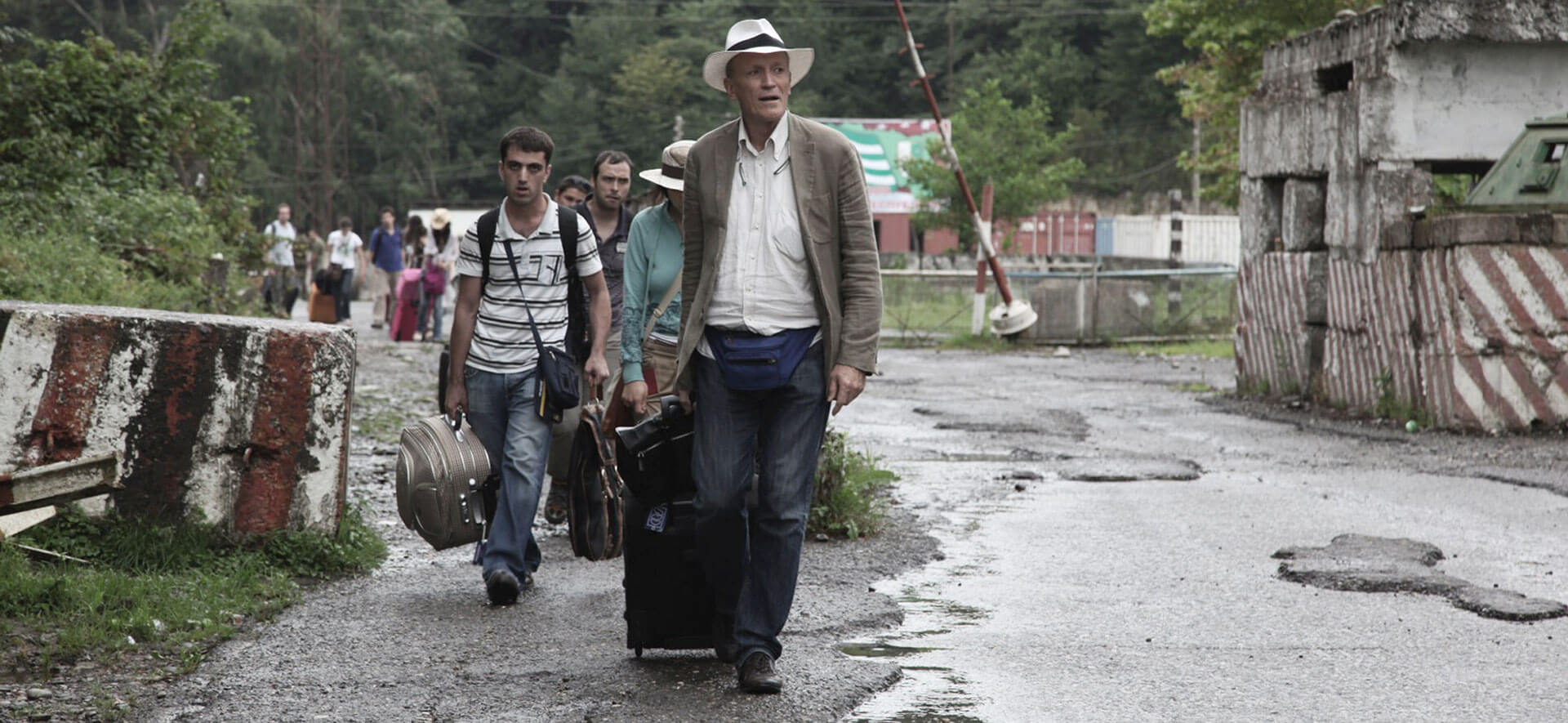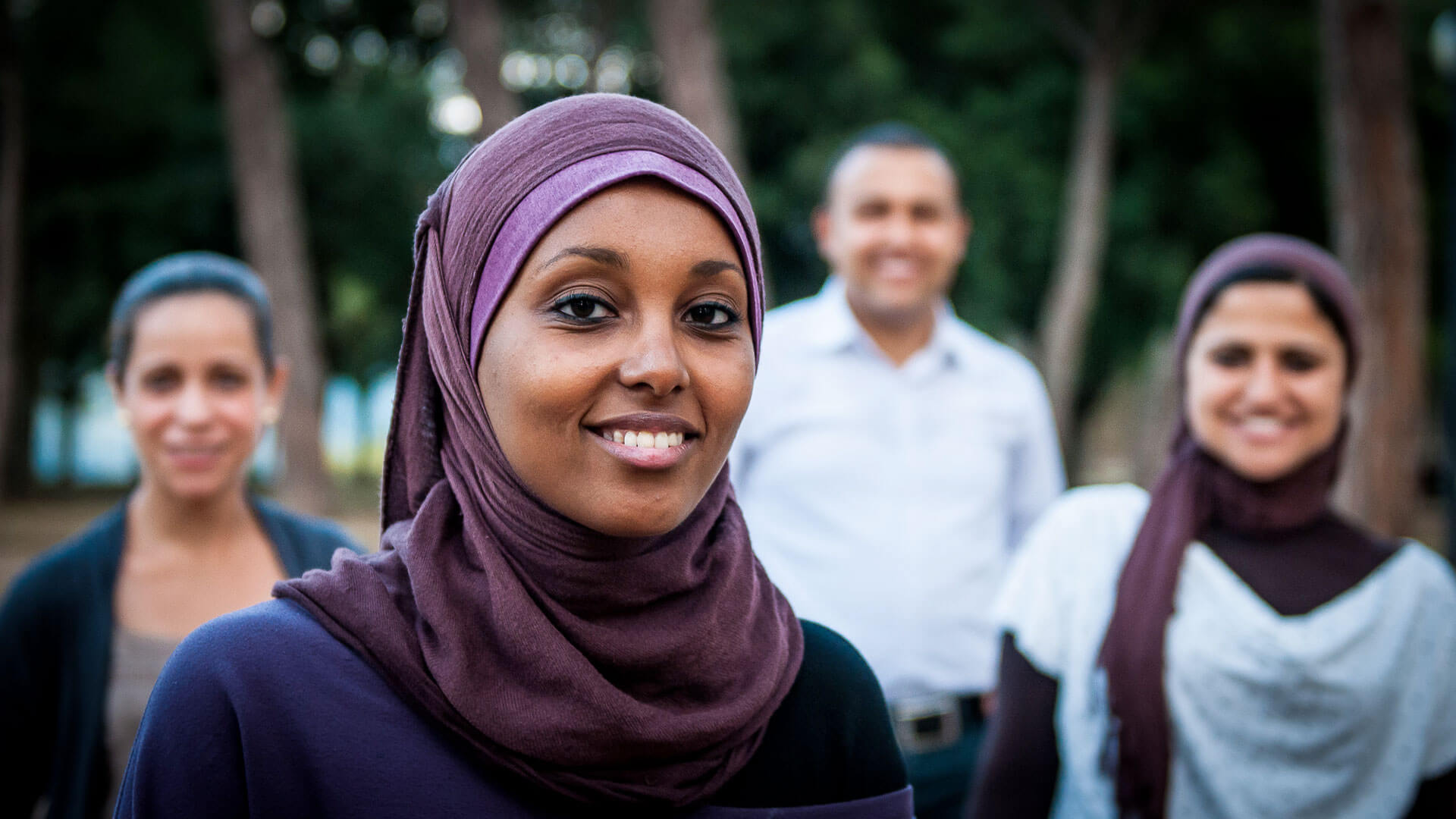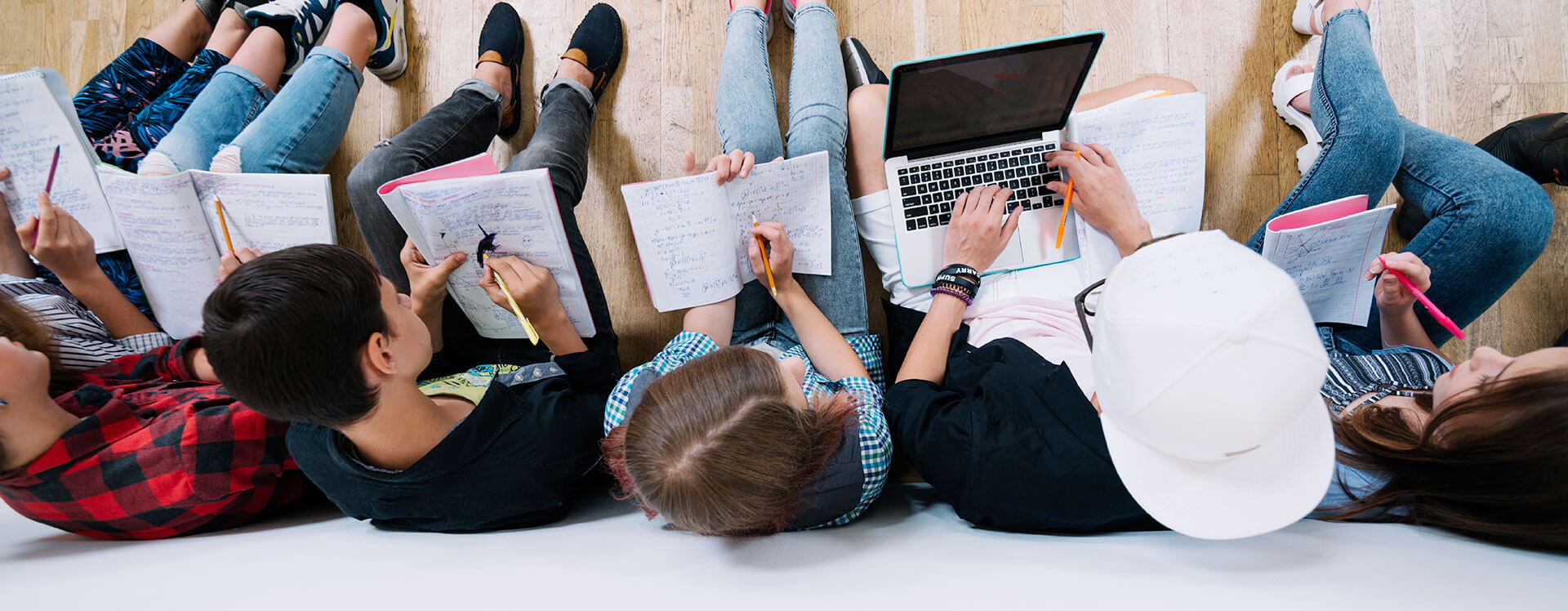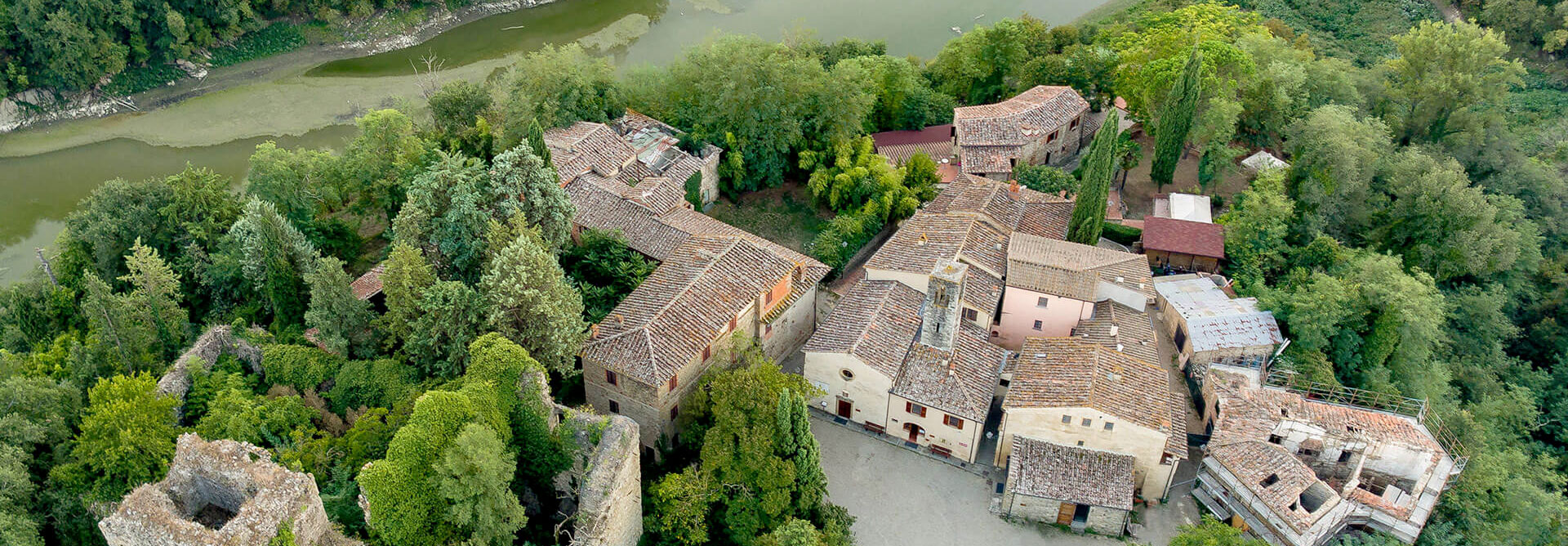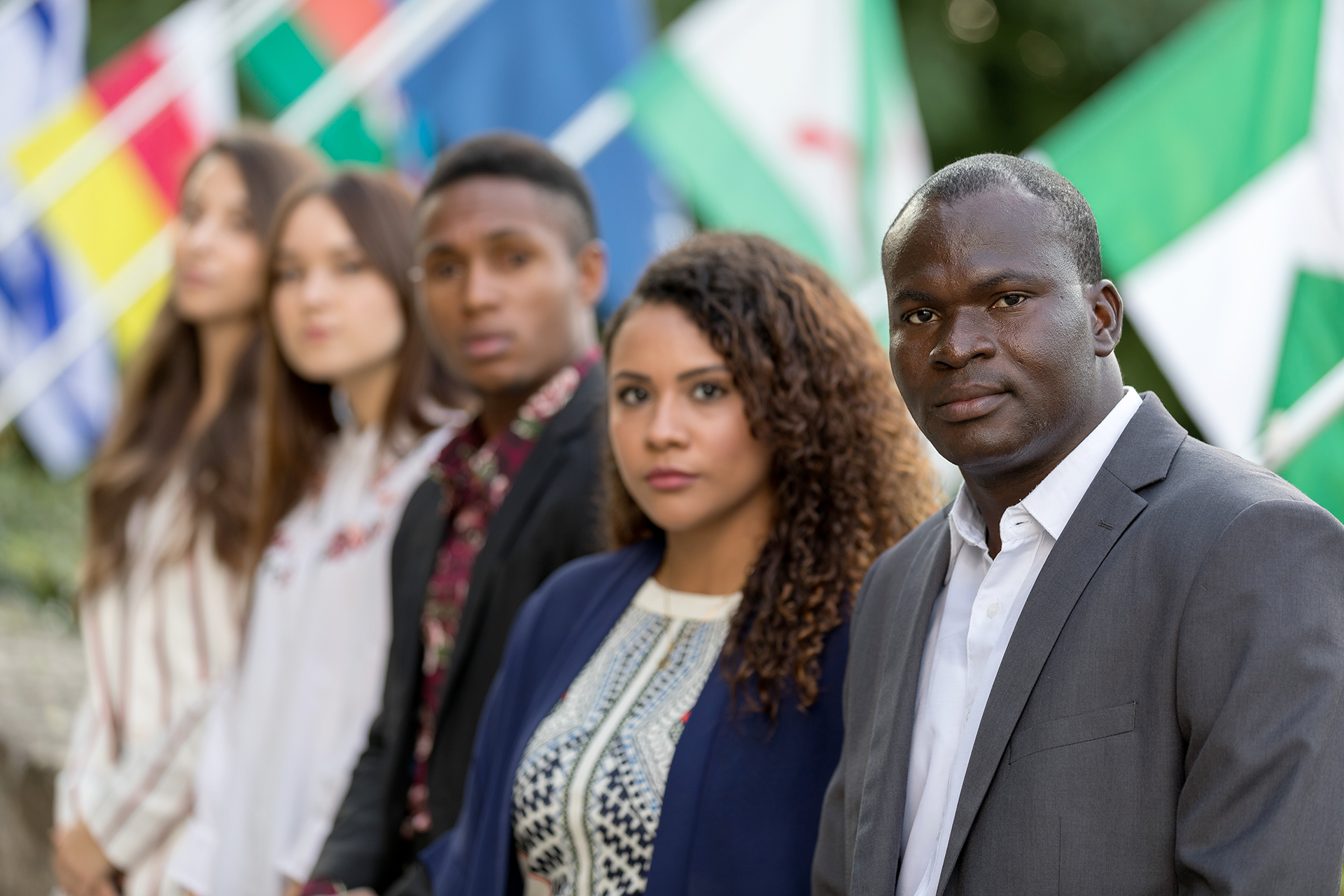The letter to Raissa Gorbačëva
In 1988, Franco Vaccari and the Rondine founders, having experienced the values of hospitality and dialogue inspired by Giorgio La Pira and Don Lorenzo Milani in a little Italian hamlet in the heart of Tuscany, decided to extend their message of peace beyond the Iron Curtain: despite not having any experience in conflict resolution, they sent a letter to Raissa Gorbačëva. Their objective was to open a communication channel with the Soviet Union and the East, overcoming the Cold War’s logic of opposition.
Unexpectedly, the Soviet first lady welcomed their proposal and invited them to Moscow. This trip marked the beginning of a relationship with the Soviet Union, a first step in second-track diplomacy.
The appeal from La Verna
In 1993, Rondine returned the hospitality by inviting Dmitrij Sergeevic Lichacev, an influential cultural figure in the new Russia who was released from a gulag after several years, to La Verna. In the Franciscan shrine, Lichacev entrusted Franco Vaccari with a mission: “Call the populations who are at war: they will make peace here!”
The journey of mediation
In 1995, a year marked by the Chechen War, this mission came into effect with a call from Moscow to the founders of Rondine to find a truce to the conflict. The delegation (which included Vaccari, Emanuele Bargellini, the prior general of the Camaldolese order, Rodolfo Cetoloni, the Franciscan provincial minister of the Tuscan Friars Minor, and Domenico Giani, then lieutenant of the Guardia di Finanza and now commander of the Gendarmerie of Vatican City) was recognized as a reliable subject by both parties: after frenzied secret talks, they obtained a 72 hour cease-fire, aiming to bring two delegations to La Verna to start the negotiations.
The cease-fire failure knocked the delegation of mediators out of the game; however, they continued to have active dialogues of trust with both parts.
The foundation of the World House
At the end of the First Chechen War, Mukadi Izrailov, the President of the University of Groznyj, asked Vaccari over the phone to host two young Chechens at Rondine, so that they could complete their studies which had been interrupted by the war. Inspired by the principles of La Pira, Vaccari said: “Yes, we will host the Chechens, provided that they will accept living together with young Russians”.
In 1998, the Studentato Internazionale – World House was founded, defining and introducing the vision of Rondine Cittadella della Pace: a place where young enemies are willing to take the challenge of interacting with one another to build a tangible relationship of peace.
The World House is at the heart of Rondine: it developed the Citadel of Peace and originated the Rondine Method. It has hosted young people who come from countries where, whether currently or recently, conflict has degenerated into violent forms; they accept to live with their own enemy, therefore facing precisely what they wanted to escape from. Together, they take on a revolutionary path, starting from the pain and the rage resulting from war – to be re-discovered as renewable energy – and elaborating on a creative transformation model. This is developed in three layers: everyday-life, educational, and academic. At the end of the two-year period, the youth of the World House have the tools to promote action and develop projects in their own countries and to be leaders in contexts characterized by transformation, elevated complexity, and high conflict.
The World House intends to host young people from the five continents, as spokespersons of degenerated local conflicts. Currently, it hosts thirty students from twenty-five different countries in Europe, Africa, America and the Near East.
Rondine International Peace Lab
Rondine International Peace Lab (IPL) is an international organization made up of almost 200 world leaders: a network crossing the entire world, applying the Rondine Method for the creative transformation of conflicts in every possible context.
The association is composed of the former alumni of the Studentato Internazionale – World House; after completing their education at the Citadel of Peace, they apply the tools and skills acquired to promote dialogue and peace processes in conflict or post-conflict contexts.
Mutual trust and professional skills are the founding elements of Rondine International Peace Lab. IPL members – former enemies who became friends through their experience at Rondine – feel and live every conflict as their own: therefore, they are prompt to act with their innovative approach in every context, even those far away from their homelands.
Rondine International Peace Lab has also made an innovative choice with its Board of Directors, preferring a representation based on personal skills, not on their geographical origin. This is a huge act of mutual trust among the IPL young leaders: indeed, someone who sits on the Board of Directors has decision-making power with respect to acting in the country of his/her former enemy.
The ambitious project of Rondine International Peace Lab is leading the world to a more peaceful future.
Ventidipacesucaucaso – Winds of peace for Caucasus
Ventidipacesucaucaso is a project born from the desire of the young people of the Studentato Internazionale – World House to re-open the dialogue in the Caucasian region, swept by the explosion of the Russian-Georgian war in August 2008. For the first time, the Rondine Method for the creative transformation of conflicts have been applied in the context of a degenerate conflict, materializing in the natural vocation of Rondine towards popular democracy through the education of young people who want to have an impact in intense conflict situations.
The project took shape with the editing of the Documento in 14 punti per la pace nel Caucaso (14 points Document for peace in Caucasus), with the collaboration of the World House young people. The text, developed and unanimously approved by 150 individuals from civil society who gathered in La Verna for the first International Conference of the Caucasus populations, has been delivered to political leaders, diplomats and international religious leaders, including Pope Benedict XVI. In 2010, a huge delegation of Rondine completed a Friendship Trip in South Caucasus and Turkey.
In February 2011, the RondinEuropa Committee was founded. Thanks to the participation of over fifty members of the European Parliament, it set the goal to put into action the document’s project proposals in the area.
A new leadership for the Southern shore of the Mediterranean
The project Una nuova classe dirigente per la Sponda Sud del Mediterraneo (A new leadership for the Southern shore of the Mediterranean) is an international cooperation process undertaken by Rondine in 2012 after the events of the so-called Arab Spring. It aimed to help the new generations from the South Mediterranean to understand the current transformation processes and actively participate in the phase of historical changes their countries were going through.
The project is articulated in local educational programs, implemented in 2012, 2013 and 2014 at the Citadel of Peace and the Centro per la Formazione alla Solidarietà Internazionale di Trento (Centre for the Education to International Solidarity of Trento): through the application of the Rondine Method, fifty young people from the Middle East and North Africa have been educated to become agents of change.
The project finished in April 2016 in Trento with the International Symposium “Sponda Sud. Nuove prospettive per il Mediterraneo” (South Shore. New perspectives for the Mediterranean).
Quarto Anno Liceale d’Eccellenza at Rondine
The Quarto Anno Rondine is a formative and educational opportunity officially recognized by the Italian Ministry of Education, Universities and Research as an experimental course in educational innovation. It is designed for students from all over Italy from Liceo Classico (Classical lyceum), Liceo Scientifico (Scientific lyceum), and Liceo delle Scienze umane (Human Sciences lyceum) who want to attend their fourth year(Italian high school is divided into five years) in an international environment such as the Citadel of Peace.
Here the Rondine Method, developed with the experiences of Studentato Internazionale – World House, is applied to the education of teenagers who are about to face the most important conflict of their lives: searching for their identity in the passage from childhood to adulthood, an unknown land that inspires fear.
In the Citadel of Peace, they undertake a path of development and self-awareness, to become not only the leaders of their own lives, but also agents of real change in their regions, as active citizens of the third millennium.
Popular Diplomacy School
The Rondine Popular Diplomacy School is the perfect continuation of the Studentato Internazionale – World House experience within the framework of the Citadel of Peace: it aims to educate people able to intervene in situations of conflicts that are likely to degenerate by bringing back dialogue and openness through a “grass-roots” promotion of symbolic, but effective projects.
The principle course in the Popular Diplomacy School is the Master Executive in Global Governance, Intercultural Relations and Peace Process Management, promoted by Rondine and the University of Siena (Department of Social, Political and Cognitive Sciences).
In an international framework where traditional diplomacy is losing its efficiency, the appearance of the so-called citizens’ diplomacy represents a significant alternative, which sees groups of people act at the non-governmental level by proposing themselves as effective speakers to reduce tensions between conflicting parties and improve the ability to understand and communicate.
The objective is educating an international class of professionals and experts in topics related to the effects of globalization and the variable conditions of international relationships: mobility, human rights, transnational and transcultural conflicts, and new diplomatic and professional tools for peace-making.
Initiative for peaceful and democratic elections in Sierra Leone
Initiative for peaceful and democratic elections in Sierra Leone is the first innovative project with an important political and social impact promoted by the Rondine International Peace Lab, aiming to foster a peaceful and informed voting process for the 2018 presidential elections in Sierra Leone.
Three local experts, including a former Rondine student, trained 12 educators, one for each region of the country, who in turn transmitted the tools they acquired about democracy, social responsibility, common good and reconciliation to 360 community leaders. The project also involved 400 young professionals in four round-tables at the main national universities. Finally, through an awareness campaign, the message reached over one million people.
The projects have created greater awareness regarding the importance of political engagement, more dialogue between the factions in conflict, and an increase in the level of personal responsibility and trust in the voting process.
The initiative represented the first application of the Rondine Method in the context of conflict and involved in several ways all the former Rondine students around the world.
Beginning of the global Campaign Leaders for Peace
Seventy years after the Universal Declaration of Human Rights and a century after the end of the First World War, the young, former students of the Citadel of Peace intend to launch an Appeal to the entire world population to take the first step towards decisive change regarding the theme of human rights.
Invited by the Italian Ministry of Foreign Affairs and the Italian Representative to the United Nations, Rondine will bring its twenty-year experience in promoting dialogue and the creative transformation of conflicts on all levels, which has been studied and now also applauded by academia, to the United Nations headquarters in New York on December 10th. With the Leaders for Peace campaign, Rondine will ask each of the 193 Member States to take a symbolic sum from its defense budget and direct it towards the training of as many global leaders that will be able to intervene in the main conflict situations in the world, promoting the development of pacified social and political relations. Rondine will also ask each Member State to consider including education of human rights in national education systems, integrating them together with the experiments of the Rondine Method on the creative transformation of conflicts.
The objective is the gradual extinction of war contexts from the world through the affirmation of a new culture that unmasks the false concept of enemy, producing immense benefits and spreading among its citizens the skills to positively transform conflicts, integrating the teaching of the Rondine Method with that of human rights.
Thank you Liliana! - the memory that becomes the future
The passing of the baton. Liliana Segre’s last public testimony to Italian schools and young people around the world from Rondine Cittadella della Pace.
It was the biggest hug in history, the one that enveloped Liliana Segre in Rondine on the morning of October 9th. The hug of millions of young people physically and virtually gathered in the Cittadella della Pace in Arezzo who from today will carry her message into the future to overturn the horror of one of the darkest pages in history. The Senator for life chose Rondine to address them, to “all those ideal grandchildren that I never tire of naming when I tell my story, since in my story there is the pain, the love, the pity, the poignant memory of what I was, a young girl, and of whom I am today the grandmother, an incredulous grandmother and sometimes incapable of being so close to her deeply, with yearning, without tears for so many years now”.
Thanks to them, that memory will continue to live, starting with the young enemies-friends of Rondine, as Segre calls them, coming from places that have experienced the drama of war. Young people belonging to peoples in conflict with each other who have chosen to go beyond hatred and wounds, and try to build a dialogue with the other side, to plan a future of peace together.
Training School for Educators
The School for Educators is a higher education course for mediators, teachers, managers, and professionals who are interested in experiencing the renewing process of the Citadel of Peace and in learning the techniques to become educators themselves.
The Rondine Method, which is currently studied and appreciated at the academic level, can be creatively transferred to any situation of conflict: therefore, the number of subjects interested in acquiring the tools to work through the contexts of their backgrounds is increasing.
The model is provided by the young people of the Studentato Internazionale – World House, who at the end of their experience at the Citadel of Peace can promote courses of action and projects aimed at the development and resolution of conflict in their own countries.
Business School
The Rondine Business School aims to provide the tools to develop a business based on the values of the human capital, producing development at the local and global levels.
At the Citadel of Peace, the Rondine Method – fed and elaborated by the experience of the World House – is applied to “humanistic business processes”, allowing the creative transformation of conflicts inside start-ups and enterprises and the exponential multiplication of the chances of success. The course welcome managers or business owners who are experiencing a period of crisis because of degenerating internal conflicts, who want to apply the Rondine Method as a challenge of rebirth.
Rondine works on the personal conflicts that the entrepreneur experiences: the maximum energy is released towards the realization of the entrepreneurial project through the application of the Method.
Applying the Rondine Method around the world
Rondine’s first ambassadors are and will always be the youngsters who lived the unique experience of the World House: after the end of the program, they have the tools to promote actions and projects aiming to transform conflicts and to the development of their countries.
For those who developed a real and deep politic vocation, a specialization course is going to be developed; although it is going to be physically hosted in the Citadel of Peace, it is going to exclusively have an international point of view. It aims to create a new global leadership involved in regenerating the humanity. A short but intense process planning a politic leadership intervention project in a third country.
The second global action course of Rondine is the application of the cross-cultural model of Quarto Anno Liceale di Eccellenza in third countries. After the acknowledged success of the first four editions at the Citadel, the didactic innovation program is exportable and applicable to an international context. The objective is to establish a global educational structure in different continents.
Simultaneously with the application of the educational programs around the world, Rondine confirms its concrete involvement with new important actions of popular democracy, whose perfect and global-impacting tool is the digital language.
The main, fundamental intervention area is still South Caucasus; this region has been marking the popular diplomacy activity of Rondine from the beginning. Following the steps of the actions taken in 2009 and 2011 with the project VentidipacesuCaucaso (Winds of peace on Caucasus) and the drafting of the Documento in 14 punti per la pace nel Caucaso (14 points Document for the peace in Caucasus), the association aims to activate digital diplomacy projects through the creation of a mobile app and an online encyclopedia about the history of the Caucasus reconciliation: an open source tool coupling with the academical analysis the contributions of young professionals and students who have been the protagonists of the Rondine educational programs.
Furthermore, the action in Sierra Leone goes on: the important results of Initiative for peaceful and democratic elections in Sierra Leone – the first, innovative project with a high political and social impact promoted by Rondine International Peace Lab – are going to be analysed by European and African academics, cultural anthropologies and political philosophers, in order to draft a document detecting and defining the tools and modalities of a new politic beyond the tribal logic.
Middle school
Rondine aims to impart its educational method in a course designed for youth in middle school, who risk, in entering their teenage years, losing the grandness of their dreams that are still prevalent in them.
They have the digital world in their hands, a language they can speak better than their parents and they must combine this with the knowledge patrimony that is going to be entrusted to them by their predecessors. Unaware that they are holders of power, in Rondine they are put in dialogue with professors and with the people from the Business and Politics School, also in the role of teacher. It is a “overturned school”, overturning the world and making it stand again. It is a new education towards responsibility.
Indeed, the Rondine Method teaches them to transfer the richness of their fantasy and imagination into the digital language, which becomes a vehicle to transform their dreams into projects that potentially will have global impact, giving birth to a new laboratory for humanity, in the time of globalization.
School of Politics for global leaders
The School of Politics for global leaders aims to create a new global leadership involved in regenerating the humanity. A short but intense process planning a politic leadership intervention project in a third country.
The School of Politics is going to educate two-hundred global leaders for peace, able to deal with the three great globalisation challenges: time acceleration, complexity increasing and conflict degeneration. As they have experienced it first-hand or have received the witness of the World House students, in Rondine future global leaders understand the effects of war as a radical dehumanisation and the dynamics the conflict came from; meanwhile, they acquire the tools to disarm war and the responsibility not to trigger it again.
Primary school
In a Citadel where the human being is renewed, the presence of primary schools is essential: children are fundamental in avoiding the dehumanization trap, as they are the only ones able to teach us how to recover the dimension of time as a free space for beauty. Play and fantasy are identified as permanent dimensions of the human being and are fixed in their educational experience so as not be lost at any age in life.
Children are protected from a culture that wants them to be efficient and excellent in every field, rushing through the stages in their lives; by being educated regarding the beauty of being unique, they are set for the future, vaccinated against those who try to steal it. As part of the “overturned school”, they will become teachers in other areas of the school, including the Politics and Business Schools.
The Citadel of the third millennium
Rondine aims to complete the Citadel of Peace both as a symbolic and tangible place for the education of a new establishment that will take leadership roles around the world and direct humanity towards a peaceful future.
This is the context in which the idea of the Citadel of the third millennium was born: a place where humanity is renewed, inspired by a method that teaches a person, wherever he/she is, to neither be a victim of conflict nor promote it, instead developing a welcoming and nurturing point of view toward life within any organizational context.
By constantly drawing on the experience of Studentato Internazionale – World House, which is the transformation of the tragic experience of war, the Rondine’s educational offering intends to expand, being constantly nurtured by the “first step” made by those young people willing to meet their own enemy at Rondine.
The Rondine Method is applied to the education programs for youths Middle school and Primary school and high education courses for adults: Popular Diplomacy School, Business School and Training School for educators.
All educational programs are going to fill the proper space in the Citadel of the third millennium , a place teeming with lives from the entire planet. Perfectly integrated in the natural frame of the Regional reserve of Ponte a Buriano and Penna, the Citadel develops along the little two-kilometres municipal street leading to the ancient hamlet, welcoming the richness of human diversity. Together with the recovery and valorisation of ancient elements – from the Castle of Rondine to its tower – the developing project includes the creation of new spaces and activities, including a didactic farm, a place for elderly and disabled people, an international art atelier, the Interreligious hug – composed by three little buildings: a church, a synagogue and a mosque – and the Regeneration bridge: on its crystal cornerstone, suspended in the air, people can discover relationships as vertigo and courage of taking one step after the other, meeting in the middle.
With a particular attention to environmental sustainability – granted by PV panels, little water supply installations and natural materials – the ancient Medieval hamlet, closed and defended, became a world-open and integrated Citadel.
With the regenerative experience of Rondine, the human richness is welcomed: it discovers again its huge potentials and receives the incentive to reveal itself to the world, in order to fulfil – with the others, different or former enemies – its vocation.
The Citadel of the third millennium will not only be a physical place, but a model. Every year it will educate and train political leaders, humanist entrepreneurs, teachers and new trainers. Humanity artisans, promoting the growth and development of new relationships and their own community: citadels where they find the spirit of Rondine, creatively permeating the original context, basing on specific dynamics and needs.
A world of leaders for peace
Two centuries after the end of the Great War, Rondine achieves its objective: a planet free from armed clashes, in which -through the diffusion of the Rondine Method – every person has the tools to transform conflicts in a creative way. A world of leaders for peace.


